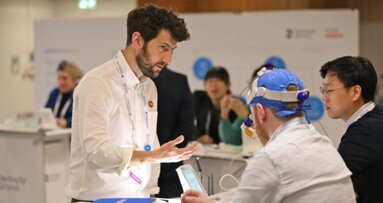SEOUL, South Korea: On 21 April, Osstem Implant held the first session of its virtual conference, the Osstem Meeting Online, which achieved over 95,000 total live cumulative views from more than 60 countries within 2.5 hours. This series of live-streamed symposia, which create a virtual conference experience for dental professionals around the globe, will culminate in a session on 27 June that will feature a socially sustainable fundraising campaign.
The world is holding its breath in the times of the coronavirus. The COVID-19 crisis is having a profound impact on social life and poses acute economic challenges for many industries, and the dental industry is no exception. Many events, including conferences and conventions, in the field are being cancelled or postponed. Osstem Implant too has announced the postponement of its 13th annual global symposium, the 2020 Osstem World Meeting in Istanbul in Turkey, to next year.
Driving a digital transition of dental conferences
At the same time, however, by employing high technology and new technical solutions for digitalisation, Osstem Implant is taking a crucial leap towards the new era of implantology. Since 2018, Osstem Implant has already been providing dental professionals with opportunities to participate in its annual global meeting by offering live-streaming services. Based on its years of experience in digital transformation, Osstem Implant invites dental professionals around the world to an entirely virtual global conference experience this year. The Osstem Meeting Online will run until 27 June 2020, and the entire programme, including nine lectures and five live surgeries, will come alive via its own interactive live-streaming platform.
Hoping that the global situation will get better, we provide the ultimate virtual live conference experience this year, bringing dental professionals of the world closer to innovative ways of living together, Osstem Implant stated.
Knowledge transfer through real-time interaction
Whether they are at entry level and keen to learn or experienced dental professionals seeking a new challenge, attendees will find relevant standard and highly advanced live surgeries and comprehensive seminars by world-renowned speakers. Allowing the maximum knowledge transfer through real-time interaction between speakers and attendees, the first session on 21 April featured two live surgeries. Covering rare cases of implant placement in partially and completely edentulous patients aged over 70, it successfully delivered first-class implant treatment educational content to participants. All attendees had the opportunity to pose real-time questions and engage further with the speakers and other participants after the session.
Towards solidarity in dental implantology
On 27 June, the conference will celebrate its grand finale with a live surgery by Dr Marco Tallarico from Italy, and this will be combined with a socially sustainable fundraising campaign, in which the speaker, Osstem Implant and all attendees will actively participate and engage with one another. The entire amount of the fund collected will be donated to an organisation in Italy for support in overcoming the COVID-19 crisis.
Register now
Next sessions will be held on 12 May and 4, 18 and 27 June. Online registration for the Osstem Meeting Online will remain open until 27 June. More information about the meeting and registration can be found here or via the social media channels of Osstem Implant.
SEOUL, South Korea: Osstem Implant is extending a cordial invitation to over 1,500 dentists from 30 countries for the 2024 Osstem World Meeting, a global ...
DUBAI, UAE: Despite the effects of the global COVID-19 pandemic on its event business, the Centre for Advanced Professional Practices (CAPP) is committed to...
SEOUL, South Korea: Osstem Implant, the top dental implant company in global sales, is accelerating its business growth and success. This is being achieved ...
I am both a litigation attorney and the president of a company that provides human resources solutions to professional practices. The two are complementary,...
MILAN, Italy: While final preparations for this year’s Spring Meeting of the European Academy of Esthetic Dentistry (EAED) are in full swing, the ...
MILAN, Italy: Osstem Implant is a diamond sponsor of the 2024 joint meeting of the European Association for Osseointegration, Italian Academy of ...
SEOUL, South Korea: On 18 and 19 April, Osstem Implant is hosting the 2025 Osstem World Meeting at the Ariyana Convention Centre in the coastal city of Da ...
CHICAGO, U.S.: The Chicago Dental Society announced in an email today (Aug. 27, 2020) that the 2021 edition of its annual meeting will be conducted entirely...
SEOUL, South Korea: Osstem Implant, a global leader in dental implant sales, showcased its commitment to advancing digital dentistry at the 2024 Osstem ...
ROUND ROCK, Texas, US: ClearCorrect, a leading provider of orthodontic solutions, continues to meet clinicians’ demand with its empowering digital ...
Live webinar
Tue. 24 February 2026
1:00 pm EST (New York)
Prof. Dr. Markus B. Hürzeler
Live webinar
Tue. 24 February 2026
3:00 pm EST (New York)
Prof. Dr. Marcel A. Wainwright DDS, PhD
Live webinar
Wed. 25 February 2026
11:00 am EST (New York)
Prof. Dr. Daniel Edelhoff
Live webinar
Wed. 25 February 2026
1:00 pm EST (New York)
Live webinar
Wed. 25 February 2026
8:00 pm EST (New York)
Live webinar
Tue. 3 March 2026
11:00 am EST (New York)
Dr. Omar Lugo Cirujano Maxilofacial
Live webinar
Tue. 3 March 2026
8:00 pm EST (New York)
Dr. Vasiliki Maseli DDS, MS, EdM



 Austria / Österreich
Austria / Österreich
 Bosnia and Herzegovina / Босна и Херцеговина
Bosnia and Herzegovina / Босна и Херцеговина
 Bulgaria / България
Bulgaria / България
 Croatia / Hrvatska
Croatia / Hrvatska
 Czech Republic & Slovakia / Česká republika & Slovensko
Czech Republic & Slovakia / Česká republika & Slovensko
 France / France
France / France
 Germany / Deutschland
Germany / Deutschland
 Greece / ΕΛΛΑΔΑ
Greece / ΕΛΛΑΔΑ
 Hungary / Hungary
Hungary / Hungary
 Italy / Italia
Italy / Italia
 Netherlands / Nederland
Netherlands / Nederland
 Nordic / Nordic
Nordic / Nordic
 Poland / Polska
Poland / Polska
 Portugal / Portugal
Portugal / Portugal
 Romania & Moldova / România & Moldova
Romania & Moldova / România & Moldova
 Slovenia / Slovenija
Slovenia / Slovenija
 Serbia & Montenegro / Србија и Црна Гора
Serbia & Montenegro / Србија и Црна Гора
 Spain / España
Spain / España
 Switzerland / Schweiz
Switzerland / Schweiz
 Turkey / Türkiye
Turkey / Türkiye
 UK & Ireland / UK & Ireland
UK & Ireland / UK & Ireland
 Brazil / Brasil
Brazil / Brasil
 Canada / Canada
Canada / Canada
 Latin America / Latinoamérica
Latin America / Latinoamérica
 USA / USA
USA / USA
 China / 中国
China / 中国
 India / भारत गणराज्य
India / भारत गणराज्य
 Pakistan / Pākistān
Pakistan / Pākistān
 Vietnam / Việt Nam
Vietnam / Việt Nam
 ASEAN / ASEAN
ASEAN / ASEAN
 Israel / מְדִינַת יִשְׂרָאֵל
Israel / מְדִינַת יִשְׂרָאֵל
 Algeria, Morocco & Tunisia / الجزائر والمغرب وتونس
Algeria, Morocco & Tunisia / الجزائر والمغرب وتونس
 Middle East / Middle East
Middle East / Middle East



















































I am inerested as an osstem user